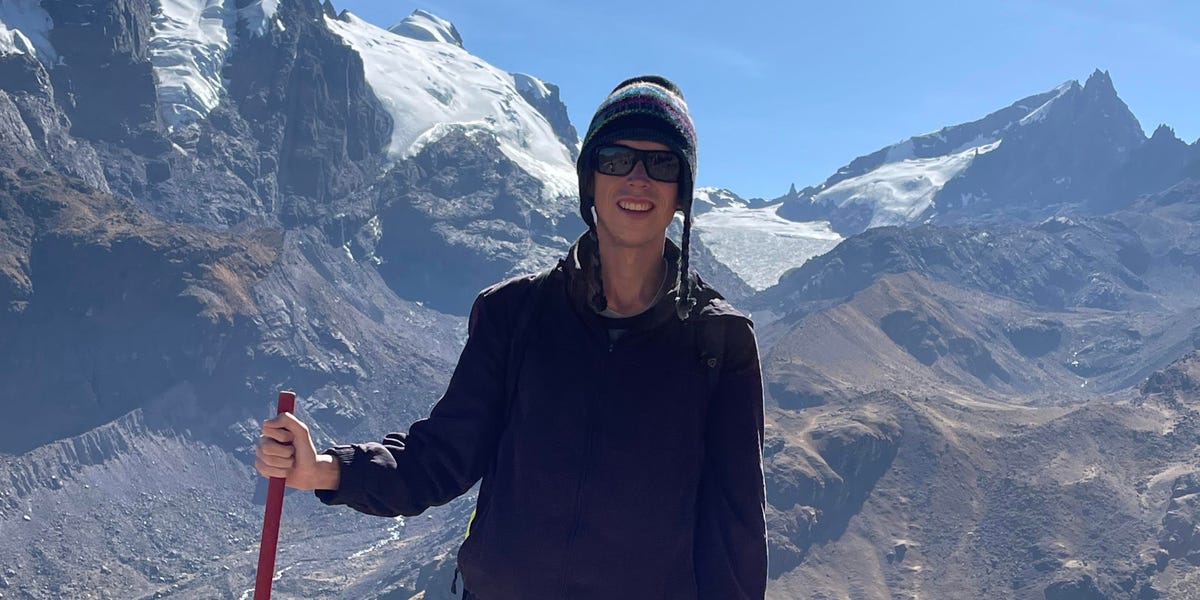This as-told-to essay is based on a conversation with Alex Brown, a 30-year-old from Hampshire, England, who moved to South Korea to teach English. The following has been edited for length and clarity.
I used to work a draining and tough job as an IT specialist. In 2021, the job went remote because of COVID-19.
After a few months of remote work, my company ordered everyone back to the office. I just couldn’t bring myself to go back to a cubicle for a job I didn’t love, so I quit without a game plan.
A few years ago, I discovered a love for traveling after going to Bali, Cambodia, India, Turkey, and many other places. I knew I wanted to find a way to travel full-time for the foreseeable future and work abroad.
I started researching and discovered programs where I could teach English in different countries. I found one program in South Korea that required you to be a citizen of a country where English was the primary language, hold a bachelor’s degree, and be willing to adapt to Korean culture.
I applied, and a private academy hired me on a one-year contract to start in September 2023.
I didn’t know what to expect before I moved
I had never been to South Korea, but I had heard that it’s a safe country and people there have a reputation for being respectful and polite.
My job is in Cheongju, a city known as the cultural center of South Korea. Cheongju has historical significance as the birthplace of Jikji, the oldest existing book printed by the world’s first moveable metal type printing system, predating even Gutenberg’s printing press. My first impression of the city was that it seemed very calm and clean.
When I arrived, I was picked up by the director of my school. He took me to the studio apartment I would stay in for the next year, which is free and included in my contract. With barely a second to rest, he took me straight back to his car, and off we went to the school for the first time.
I also started work earlier than I had planned. My contract was for September 1, but when I arrived on August 21, they told me I’d start the next day. This came as a surprise.
That experience was my first lesson about Korean culture. Things move very quickly here. In my first week, I was taken to the hospital for a health check. I underwent a series of tests, and they took just seconds each.
I’ve been surprised at how exceptionally kind the people I’ve met are. I’ve connected with new people here quicker than expected, especially other teachers.
One day when I was walking home in a heavy downpour of rain, a man I’d never met saw me and came over with an umbrella. Even though I was a complete stranger, he offered it to me.
My job is laid-back and much better than sitting behind a desk
I teach conversational English to children aged 5-15 and really enjoy it. Most of the kids I teach have a solid foundation in the language, so I help them practice and perfect their English skills.
The job comes with benefits like free flights between your home country and South Korea and severance pay equal to one month’s wages upon contract completion.
I make £1,200 a month after taxes and insurance, which is less than my old job in IT, but I get those benefits and the opportunity to live in Asia and travel to nearby countries during the holidays.
Since I don’t pay for housing, I mostly spend my income on food, which costs up to $280 monthly.
The country is tricky to navigate
Of the 67 countries I’ve been to so far, South Korea is surprisingly one of the hardest to navigate because many navigation apps I’m the most familiar with, like Google Maps, don’t work here. I’ve had to rely on Korean versions, like Naver Maps, but I’m still learning how to use them.
They also don’t have widespread rideshare services like Uber or Lyft here. They mostly use something called Kakao Taxi, which is a local Uber equivalent that has an option to pay in cash.
The prices are reasonable. A 20-minute journey to Cheongju Airport costs around $10. Supply is plentiful — much more so than Uber in many other cities — so you don’t have to wait long.
I don’t speak Korean, which has proven to be challenging
Outside of my school environment, it’s hard to find anyone who speaks English. I haven’t learned a lot of Korean yet and can only say a few words.
I rely heavily on translation apps like Papago, the local equivalent of Google Translate. Sometimes these apps don’t work well and provide me with funny translations that are inaccurate. I use a combination of broken translations and hand gestures to get my point across.
I don’t miss a lot about living in the UK
I miss my friends and family and watching my favorite football team play in the UK. Other than that, I don’t miss living there.
The UK is an expensive place to live and it’s even hard to travel within the country without a big budget.
I’m glad I picked South Korea to live for a year
My experience here has been positive so far. It’s a nice, calm, and quiet country that’s mostly affordable.
My goal is to save as much money as possible to travel around Latin America and the Caribbean with my girlfriend after my job ends in September. After that, I want to find a job where I can work remotely so I can travel whenever I’d like.
I don’t want to stop being a nomad — I love seeing the world.


